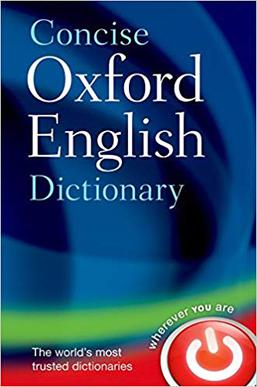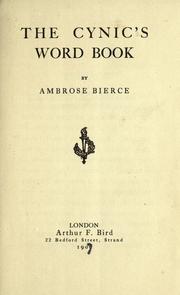
Magna Carta Libertatum, commonly called Magna Carta or sometimes Magna Charta, is a royal charter of rights agreed to by King John of England at Runnymede, near Windsor, on 15 June 1215. First drafted by the Archbishop of Canterbury, Cardinal Stephen Langton, to make peace between the unpopular king and a group of rebel barons, it promised the protection of church rights, protection for the barons from illegal imprisonment, access to swift and impartial justice, and limitations on feudal payments to the Crown, to be implemented through a council of 25 barons. As neither side stood by their commitments, the charter was annulled by Pope Innocent III, leading to the First Barons' War.

The New Oxford American Dictionary (NOAD) is a single-volume dictionary of American English compiled by American editors at the Oxford University Press.

Profanity, also known as swearing, cursing, or cussing involves the use of notionally offensive words for a variety of purposes, including to demonstrate disrespect or negativity, to relieve pain, to express a strong emotion, as a grammatical intensifier or emphasis, or to express informality or conversational intimacy. In many formal or polite social situations, it is considered impolite, and in some religious groups it is considered a sin. Profanity includes slurs, but there are many insults that do not use swear words.
Roget's Thesaurus is a widely used English-language thesaurus, created in 1805 by Peter Mark Roget (1779–1869), British physician, natural theologian and lexicographer.
A thesaurus, sometimes called a synonym dictionary or dictionary of synonyms, is a reference work which arranges words by their meanings, sometimes as a hierarchy of broader and narrower terms, sometimes simply as lists of synonyms and antonyms. They are often used by writers to help find the best word to express an idea:
...to find the word, or words, by which [an] idea may be most fitly and aptly expressed

Viz is a British adult comic magazine founded in 1979 by Chris Donald. It parodies British comics of the post-war period, notably The Beano and The Dandy, but with extensive profanity, toilet humour, black comedy, surreal humour and generally sexual or violent storylines. It also sends up tabloid newspapers, with mockeries of articles and letters pages. It features parody competitions and advertisements for overpriced 'limited edition' tat, as well as obsessions with half-forgotten kitsch celebrities from the 1960s to the 1980s, such as Shakin' Stevens and Rodney Bewes. Occasionally, it satirises current affairs and politicians, but it has no particular political standpoint.

Merriam-Webster, Incorporated is an American company that publishes reference books and is mostly known for its dictionaries. It is the oldest dictionary publisher in the United States.

The Concise Oxford English Dictionary is one of the best-known of the 'smaller' Oxford dictionaries. The latest edition contains over 240,000 entries and 1,728 pages. Its 12th edition, published in 2011, is used by both the United Nations (UN) and NATO as the current authority for spellings in documents in English for international use. It is available as an e-book for a variety of handheld device platforms. In addition to providing information for general use, it documents local variations such as United States and United Kingdom usage.

The Macquarie Dictionary is a dictionary of Australian English. It is considered by many to be the standard reference on Australian English. It also pays considerable attention to New Zealand English. Originally it was a publishing project of Jacaranda Press, a Brisbane educational publisher, for which an editorial committee was formed, largely from the Linguistics department of Macquarie University in Sydney, Australia. It is now published by Macquarie Dictionary Publishers, an imprint of Pan Macmillan Australia Pty Ltd. In October 2007 it moved its editorial office from Macquarie University to the University of Sydney, and later to the Pan Macmillan offices in the Sydney central business district.

Welsh rarebit or Welsh rabbit is a dish of hot cheese sauce served on toasted bread. The original 18th-century name of the dish was the jocular "Welsh rabbit", which was later reinterpreted as "rarebit", as the dish contains no rabbit. Variants include English rabbit, Scotch rabbit, buck rabbit, golden buck, and blushing bunny.
WordWeb is an international English dictionary and thesaurus program for Microsoft Windows, iOS, Android and Mac OS X. It is partly based on the WordNet database.
A bleep censor is the replacement of offensive language or classified information with a beep sound, used in television and radio.
Many languages have words expressing indefinite and fictitious numbers—inexact terms of indefinite size, used for comic effect, for exaggeration, as placeholder names, or when precision is unnecessary or undesirable. One technical term for such words is "non-numerical vague quantifier". Such words designed to indicate large quantities can be called "indefinite hyperbolic numerals".

The Devil's Dictionary is a satirical dictionary written by American journalist Ambrose Bierce, consisting of common words followed by humorous and satirical definitions. The lexicon was written over three decades as a series of installments for magazines and newspapers. Bierce's witty definitions were imitated and plagiarized for years before he gathered them into books, first as The Cynic's Word Book in 1906 and then in a more complete version as The Devil's Dictionary in 1911.

The Oxford Advanced Learner's Dictionary (OALD) was the first advanced learner's dictionary of English. It was first published in 1948. It is the largest English-language dictionary from Oxford University Press aimed at a non-native audience. Users with a more linguistic interest, requiring etymologies or copious references, usually prefer the Concise Oxford English Dictionary, or indeed the comprehensive Oxford English Dictionary, or other dictionaries aimed at speakers of English with native-level competence.
The Latin phrase gradus ad Parnassum means "steps to Parnassus". It is sometimes shortened to gradus. Parnassus is the prominence of a mountain range in central Greece, a few kilometres north of Delphi, of which the two summits, in Classical times, were called Tithorea and Lycoreia. In Greek mythology, one of the peaks was sacred to Apollo and the nine Muses, the inspiring deities of the arts, and the other to Dionysus. The phrase came to be used by authors of various books of instruction with the aid of which gradual progress and mastery in an art or scholarly discipline is sought.
A slang dictionary is a reference book containing an alphabetical list of slang, which is vernacular vocabulary not generally acceptable in formal usage, usually including information given for each word, including meaning, pronunciation, and etymology. It can provide definitions on a range of slang from more mundane terms to obscure sexual practices. Such works also can include words and phrases arising from different dialects and argots, which may or may not have passed into more common usage. They can also track the changing meaning of the terms over time and space, as they migrate and mutate.

The Longman Dictionary of Contemporary English (LDOCE), first published by Longman in 1978, is an advanced learner's dictionary, providing definitions using a restricted vocabulary, helping non-native English speakers understand meanings easily. It is available in four configurations:
Magyar szótár is a Hungarian language reference work by Hungarian translator Tibor Bartos published in 2002 by Corvina publishing house. It is a cross of a dictionary of synonyms and a thesaurus. Rather than relying on methods of computational linguistics, the vocabulary has been compiled manually as a by-product of translation work done by the author over his lifelong career as a translator of literary works.

The Oxford Dictionary of English (ODE) is a single-volume English dictionary published by Oxford University Press, first published in 1998 as The New Oxford Dictionary of English (NODE). The word "new" was dropped from the title with the Second Edition in 2003. The dictionary is not based on the Oxford English Dictionary (OED) – it is a separate dictionary which strives to represent faithfully the current usage of English words. The Revised Second Edition contains 355,000 words, phrases, and definitions, including biographical references and thousands of encyclopaedic entries. The Third Edition was published in August 2010, with some new words, including "vuvuzela".













